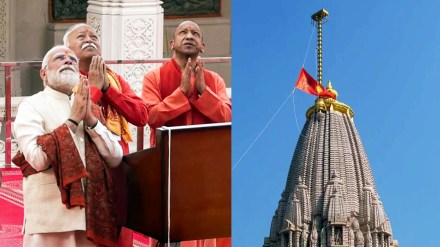Pakistan has sharply criticised India over the recent flag-hoisting ceremony at the Ram Temple in Ayodhya, calling it a troubling signal for minority rights in the country. In a statement issued on November 25, Pakistan’s Ministry of Foreign Affairs described the temple as being built on the site of the demolished Babri Masjid and expressed “deep concern” over what it views as growing intolerance and “marginalisation” of Muslims in India. The sacred flag was hoisted by Prime Minister Narendra Modi atop the Ram Janmabhoomi Temple, marking a milestone in the shrine’s inauguration.
“Pakistan has noted with deep concern the flag hoisting at the so-called ‘Ram Temple’ constructed on the site of the historic Babri Mosque in Ayodhya. The Babri Mosque, a centuries-old place of worship, was demolished on 6 December 1992 by extremist mobs inspired by fascist ideologies,” the statement reads.
The statement criticises the judicial and political processes in India that followed the demolition. Pakistan claimed that those responsible for the destruction of the mosque were later “acquitted,” and that legal decisions paved the way for constructing the temple.
“The subsequent judicial processes in India, which acquitted those responsible and permitted construction of a temple on the demolished mosque’s site, speak volumes about the Indian state’s discriminatory approach towards minorities,” the statement said.
Allegations of systemic marginalisation of Muslims
Linking the flag-hoisting ceremony to broader issues, Pakistan accused India of marginalising its Muslim community socially, economically, and politically. The statement noted that the event in Ayodhya was “deliberate attempt to erode Muslim cultural and religious heritage under the influence of majoritarian Hindutva ideology”. The Pakistan ministry asserted that several other historic mosques across India now face similar risks of demolition or alteration.
“Numerous historic mosques now face similar threats of desecration or demolition, while Indian Muslims continue to experience growing social, economic, and political marginalisation,” it added.
Call for global intervention
Pakistan also appealed to global institutions, urging the United Nations and international human rights organisations to take notice of what it described as rising Islamophobia and increasing hate speech in India. It called for international intervention to protect Muslim heritage sites and ensure the safeguarding of minority rights under global treaties and conventions.
“The United Nations and relevant international bodies must play a constructive role in safeguarding Islamic heritage and ensuring the protection of the religious and cultural rights of all minorities,” the statement said.
Pakistan urges India to protect minority rights
Additionally, Pakistan urged the Indian government to fulfil its responsibility of protecting all religious communities within its borders. “Pakistan urges the Government of India to uphold its responsibilities by ensuring the security of all religious communities, including Muslims, and by protecting their places of worship in accordance with international human rights obligations,” it concluded.
Meanwhile, the ceremony in Ayodhya was celebrated as a historic moment marking the inauguration phase of the grand temple, and was attended by Prime Minister Narendra Modi, Uttar Pradesh Chief Minister Yogi Adityanath, and RSS chief Mohan Bhagwat.
